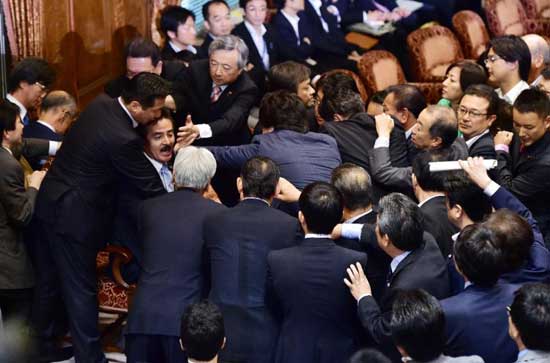-
Tips for becoming a good boxer - November 6, 2020
-
7 expert tips for making your hens night a memorable one - November 6, 2020
-
5 reasons to host your Christmas party on a cruise boat - November 6, 2020
-
What to do when you’re charged with a crime - November 6, 2020
-
Should you get one or multiple dogs? Here’s all you need to know - November 3, 2020
-
A Guide: How to Build Your Very Own Magic Mirror - February 14, 2019
-
Our Top Inspirational Baseball Stars - November 24, 2018
-
Five Tech Tools That Will Help You Turn Your Blog into a Business - November 24, 2018
-
How to Indulge on Vacation without Expanding Your Waist - November 9, 2018
-
5 Strategies for Businesses to Appeal to Today’s Increasingly Mobile-Crazed Customers - November 9, 2018
Japanese lawmakers fight over security bill
Unlike in July, when the bills were passed by the lower house amid an opposition walkout, the main opposition Democratic Party of Japan remained in the chamber and voted against the bills.
Advertisement
“Pacifism is deeply embedded in Japanese national identity as a foundation for the peace and prosperity achieved in the postwar period”, said Jeff Kingston, director of Asian Studies at Temple University in Japan.
Legislators climbed over their desks, exchanged punches and clobbered together in a giant pile in the middle of the Thursday night debate session.
“It’s happened in stages and for the best part the public did not see it coming, but as the nation, and hopefully those outside of Japan have also seen recently, the public; the real Japanese people who don’t harbor such nationalistic, revisionist and ultra right-wing tendencies, do not support the militaristic direction that (prime minister) Abe is leading the country in”, Tetsuya Murata, a founding member of SEALDs, told Xinhua.
The new law would permit Japan’s military to act in “collective self-defence” if its interests were threatened at home or overseas , an action that critics say violate the pacifist constitution established after Japan’s defeat in World War II.
For example, Japan would be able to intercept a missile flying over Japan that is headed for US territory.
In layman’s terms, certain lawmakers don’t want the Japanese military to go looking for fights, so proper fades were at least attempted to be delivered when they saw the vote wasn’t going their way.
The maneuvers were destined to fail, but ate up hours of time requiring debate and votes on each measure. They made long-winded speeches to explain them.
The scene grew more violent as the two sides exchange slaps, shoves and punches.
The opposition vowed to keep fighting the bill as it works its way toward the final vote.
Today, after failed last-ditch opposition efforts that included the triggering of a brawl in the Diet yesterday, the Diet voted to loosen restrictions on the ability of the country’s military to fight overseas for the first time since World War II. TORU HANAI/REUTERS Masahisa Sato (top c.), a member of the upper house special committee on security, and other lawmakers shout during the brawl.
President of the upper house Masaaki Yamazaki said the bills passed with 148 lawmakers voting in favour, compared to 90 against.
Meanwhile, protesters outside braved heavy rain to show their disdain for the increased military power. But under the new law, the armed forces can come to the aid of allies under a concept known as collective self-defense.
The passage of the new security bills is a major milestone for Prime Minister Shinzo Abe, as he pursues his agenda of reducing limits on the military placed by pacifist Article Nine of the U.S-drafted, post-war constitution.
Of course, this is not the first time Japan’s military has been allowed greater latitude for defensive operations – it has steadily accrued popular confidence and global respect since the 1950s – but Abe’s reforms are also not the wholesale normalization of Japan’s military that many USA planners would like.
Advertisement
The government here has said reforms are important because until now the United States has been obliged by treaty to defend Japan, but not the other way round.





























